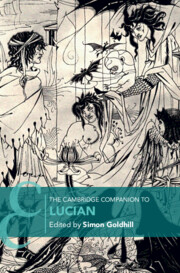Book contents
- Frontmatter
- Contents
- List of Figures and Tables
- List of Contributors
- 1 Introduction
- Part I
- Part II
- Part III
- 16 Lucian of Samosata in Renaissance Italy
- 17 Lucian Goes North: The Luciani Opuscula of Erasmus and Thomas More
- 18 From the Eighteenth to the Nineteenth Century: Voltaire, Leopardi, and a New Avenue of Philosophical Critique
- References
- Index Locorum
- Subject Index
- Cambridge Companions to Literature
18 - From the Eighteenth to the Nineteenth Century: Voltaire, Leopardi, and a New Avenue of Philosophical Critique
from Part III
Published online by Cambridge University Press: 07 November 2024
- Frontmatter
- Contents
- List of Figures and Tables
- List of Contributors
- 1 Introduction
- Part I
- Part II
- Part III
- 16 Lucian of Samosata in Renaissance Italy
- 17 Lucian Goes North: The Luciani Opuscula of Erasmus and Thomas More
- 18 From the Eighteenth to the Nineteenth Century: Voltaire, Leopardi, and a New Avenue of Philosophical Critique
- References
- Index Locorum
- Subject Index
- Cambridge Companions to Literature
Summary
This chapter investigates the reception of Lucian in Voltaire’s works and Giacomo Leopardi’s Operette morali. I argue that Lucian’s contamination of codified genres, especially clear in his Prometheus es in verbis, into a new satirical genre provided the two modern authors with a useful tool to innovate the literary conventions of their times and to create a hybrid, polemical, humorous prose – a previously uncanonised form of philosophical critique. Voltaire is influenced, directly and indirectly, by Lucian not only in his dialogues, but also in the creation of his conte philosophique as a form of mélange and in the use of defamiliarising devices such as cosmic travel and the dialogue of the dead. In Leopardi’s works, where Lucian is the most present ancient author and his influence is openly acknowledged, the imitation of Lucian is clearly part of a global effort by Leopardi to reform Italian culture and its literary conventions. Nevertheless, together with the problematic status of Lucian, the canonical status and literary reception of Voltaire and Leopardi in their national cultures helped eclipse Lucian’s model, as the two modern authors took his place in exerting their influence, while absorbing and innovating on Lucian’s hybridised writing.
- Type
- Chapter
- Information
- The Cambridge Companion to Lucian , pp. 384 - 406Publisher: Cambridge University PressPrint publication year: 2024

